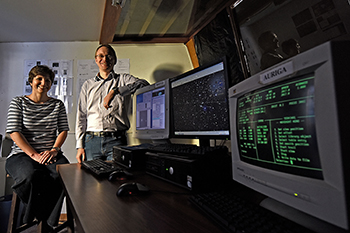
Hélène Szegedi and Dr Brian van Soelen are scientists in the
Department of Physics at the University of the Free State.
Photo: Charl Devenish
In August 2017, the Boyden Observatory in Bloemfontein played a major role in obtaining optical observations of one of the biggest discoveries ever made in astrophysics: the detection of an electromagnetic counterpart to a gravitational wave event.
An article reporting on this discovery will appear in the prestigious science journal, Nature, in October 2017. Co-authors of the article, Dr Brian van Soelen and Hélène Szegedi, are from the Department of Physics at the University of the Free State (UFS). Both Dr Van Soelen and Szegedi are researching multi-wavelength astronomy.
Discovery is the beginning of a new epoch in astronomy
Dr van Soelen said: “These observations and this discovery are the beginning of a new epoch in astronomy. We are now able to not only undertake multi-wavelength observations over the whole electromagnetic spectrum (radio up to gamma-rays) but have now been able to observe the same source in both electromagnetic and gravitational waves.”
Until recently it was only possible to observe the universe using light obtained from astronomical sources. This all changed in February 2016 when LIGO (Laser Interferometer Gravitational-Wave Observatory) stated that for the first time they had detected gravitational waves on 14 September 2015 from the merger of two black holes. Since then, LIGO has announced the detection of two more such mergers. A fourth was just reported (27 September 2017), which was the first detected by both LIGO and Virgo. However, despite the huge amount of energy released in these processes, none of this is detectable as radiation in any part of the electromagnetic spectrum. Since the first LIGO detection astronomers have been searching for possible electromagnetic counterparts to gravitational wave detections.
Large international collaboration of astronomers rushed to observe source
On 17 August 2017 LIGO and Virgo detected the first ever gravitational waves resulting from the merger of two neutron stars. Neutron star mergers produce massive explosions called kilonovae which will produce a specific electromagnetic signature. After the detection of the gravitational wave, telescopes around the world started searching for the optical counterpart, and it was discovered to be located in an elliptical galaxy, NGC4993, 130 million light years away. A large international collaboration of astronomers, including Dr Van Soelen and Szegedi, rushed to observe this source.
At the Boyden Observatory, Dr Van Soelen and Szegedi used the Boyden 1.5-m optical telescope to observe the source in the early evening, from 18 to 21 August. The observations obtained at Boyden Observatory, combined with observations from telescopes in Chile and Hawaii, confirmed that this was the first-ever detection of an electromagnetic counterpart to a gravitational wave event. Combined with the detection of gamma-rays with the Fermi-LAT telescope, this also confirms that neutron star mergers are responsible for short gamma-ray bursts.
The results from these optical observations are reported in A kilonova as the electromagnetic counterpart to a gravitational-wave source published in Nature in October 2017.
“Our paper is one of a few that will be submitted by different groups that will report on this discovery, including a large LIGO-Virgo paper summarising all observations. The main results from our paper were obtained through the New Technology Telescope, the GROND system, and the Pan-STARRS system. The Boyden observations helped to obtain extra observations during the first 72 hours which showed that the light of the source decreased much quicker than was expected for supernova, classifying this source as a kilonova,” Dr Van Soelen said.